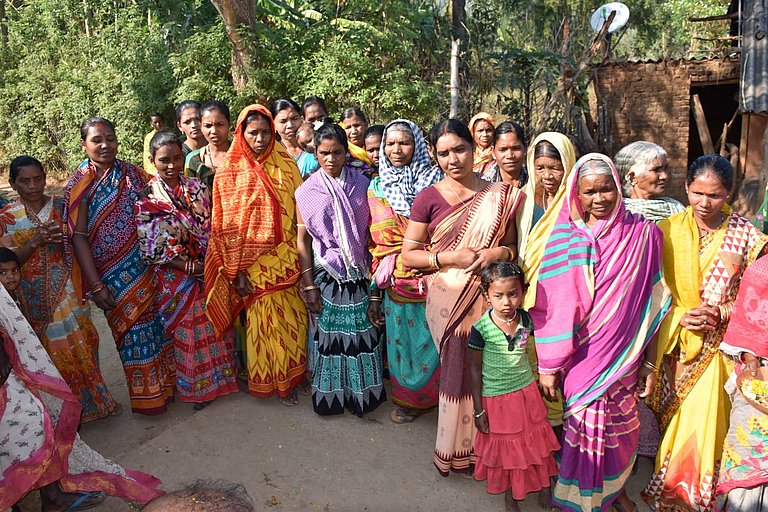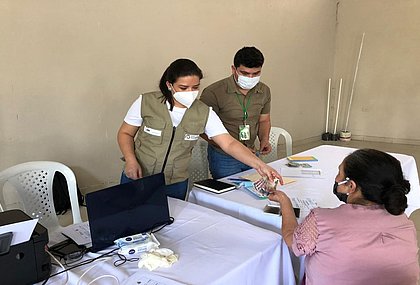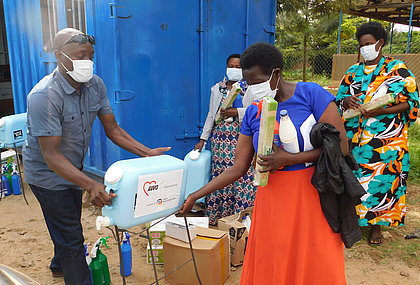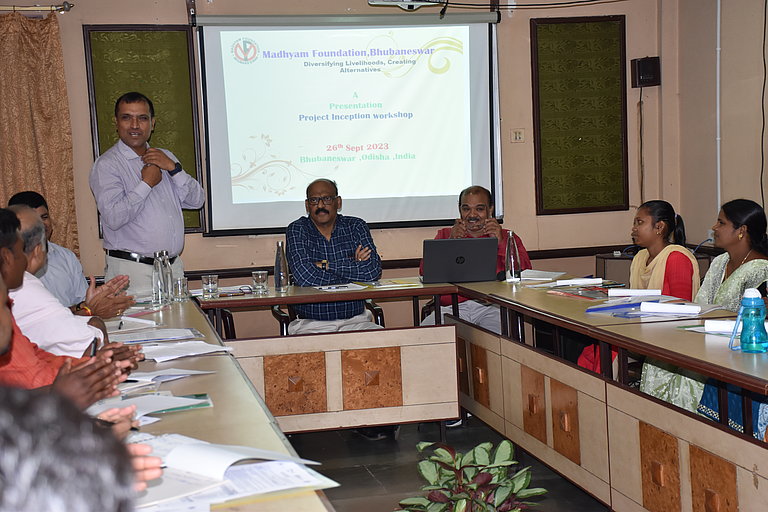
The state of Odisha in northeast India is affected by climate change in many ways, we can see fluctuation of metrological parameters like rising temperature, as well as shift in weather pattern and rainfall intensity, leading to large-scale devastation floods, prolongation of drought, decrease in ground water level, and dry spells at an interval every two years. Climate Change impacts food security in multiple ways resulting in severe socio-economic consequences like the disruption of trade, livelihood distress, income, and production. A massive decline in agricultural production is the result.
In the district of Kandhamal, AWO International is working in cooperation with the Indian partner organization Madhyam Foundation. Kandhamal is one of the 110 poorest districts in India and is marked as an aspirational district[1]. Kandhamal ranked scored 0.606 in the HDI (2021) where 44.75 % of the population lives below the poverty line. The district occupies the last position among all the 30 districts in terms of food security. The majority of the district inhabitants belong to the Kondh ethnic group (tribe), they own about 77% of arable land, with the average land ownership per family being 1.01 acres (0.4 hectares) or less. About 80 - 85 % of the state’s population lives in rural areas and depends on agriculture. Agriculture contributes about 26 % to the Gross State Domestic Product and almost 60 % of land depends on rain-fed cultivation. Assured Irrigation facilities are minimal in the district and people of Kandhamal are increasingly exposed to social and economic exploitation and have only limited land rights and market access. The lack of opportunities for income generation increasingly threatens the food and nutrition security. Furthermore, access to institutional finance and credit remains a challenge for most marginalized smallholder and subsistence farmers.
[1] Aspirational Districts are those districts in India, that are affected by poor socio-economic indicators.
Climate-friendly farming methods as a first step
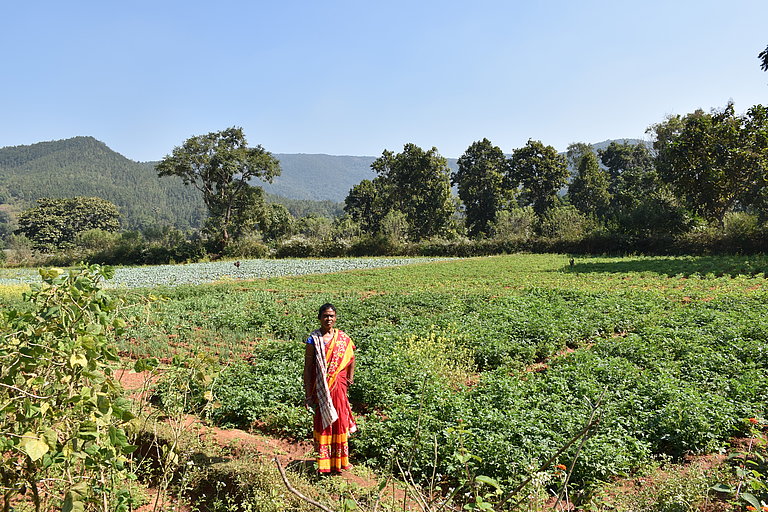
The project, which started in August 2023, sees the introduction of climate-friendly and sustainable farming methods as the first step to increase production and improve food supply. As part of the project activities, smallholder farmers are trained in organic farming methods for vegetables, paddy, pulses, millet and lemon grass cultivation, and are provided with local and high-yielding seeds. Practical demonstrations on organic fertilizer production, pest control and soil management are also an integral part of the training sessions. To support the farming activities further, the project plans to set up production and sales units for organic fertilizers and pesticides. In addition to this, the households will be supported to establish Nutri-gardens on their farms. The aim is to produce vegetables for own consumption and as a source of income, thus also improving the nutritional intake. Due to the close proximity, different types of vegetables, herbs and fruits are increasingly consumed among the beneficiaries. In order to ensure the cultivation of various agricultural crops throughout the year, various water harvesting facilities are being built, which the community members then will have access to all year round.
How the targeted communities are actively involved in the project
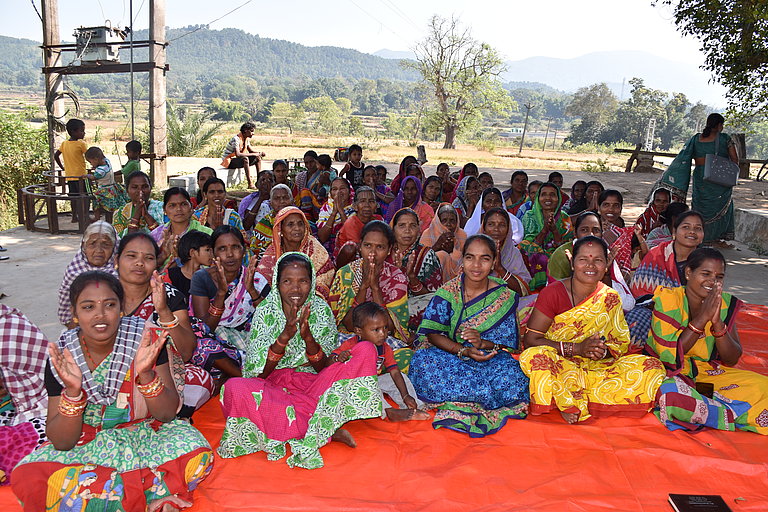
The project also aims to establish active climate change action groups (CCAG) to contribute to local environmental and disaster risk reduction efforts and disseminate related information to the communities. The 52 groups prepare disaster management plans and are also responsible for the selection and maintenance of the water harvesting facilities. Among them are 3900 women who also work to demand higher wages, more land ownership, and more say in decision-making processes at the household and community levels. The communities are thus sensitized to environmental protection and WASH as well as to gender discrimination. Furthermore, the project will form 135 producer groups (PGs), which will include 4,050 local farmers. A Farmer’s Producer Organization (FPO) will be formed as an umbrella organization of the PGs. The FPO collect agricultural yields, sell them at local markets and exchange ideas for market linkage and production. PGs also produce and sell organic fertilizers, pesticides, seeds and other agricultural inputs. For this purpose, the project plans to establish collection centres for the agricultural products in the communities and facilitates access to wholesalers. Landless farmers are further provided with goats and training on goat rearing.
The project's diverse participatory approaches strengthen the collective responsibility and capacity of the targeted communities to sustainably improve their livelihoods and further adapt to the impacts of climate change.
Projectinfo
| Project | Building Climate Resilient Communities for Food and Income Security |
|---|---|
| Place/Region | Kandhamal, Odisha, India |
| Partner | Madhyam Foundation |
| Target group | The direct target group consists of 5,000 households with a total of 21,800 people (of which 10,968 are women and 10,831 are men) from a total of 52 communities of 5 Gram Panchayats in Raikia block |
| Activities |
|
| Duration | 01.08.2023 – 31.07.2026 |
| Budget | 1,2 Million Euro total budget |
| Sponsor | Aktion Deutschland Hilft (ADH) and Bundesministerium für Wirtschaftliche Zusammenarbeit und Entwicklung (BMZ) |
